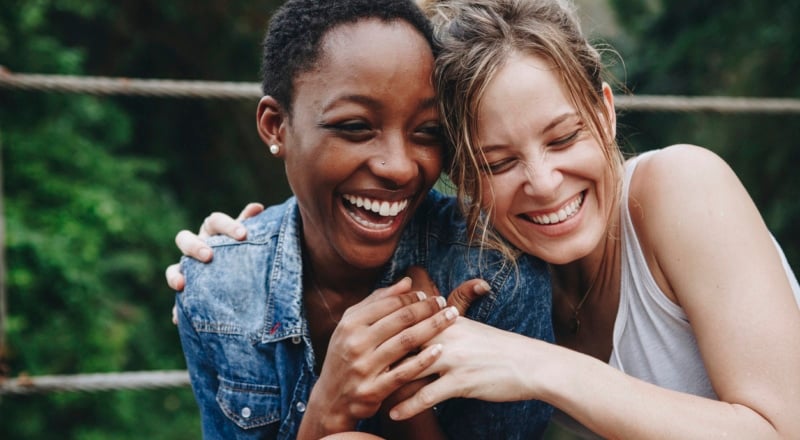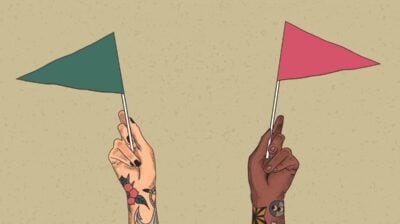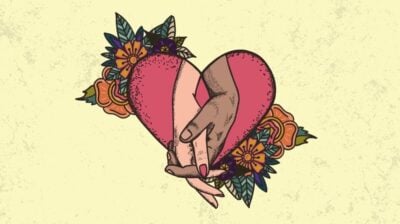Am I in a healthy relationship?
Every relationship has ups and downs, but it helps to know what a healthy and unhealthy relationship looks like.

Our relationships with other people can have a big impact on our mental and emotional wellbeing. With healthy relationships in our lives, we’re more likely to feel positive and confident. With unhealthy relationships in our lives, we’re more likely to feel negative and insecure. This is the case whether it’s your relationship with a romantic partner, friends, family members, or even with professionals in our day to day lives like teachers or lecturers.
Being able to recognise the difference between a healthy and an unhealthy relationship, can help you build and prioritise healthier relationships in your life.
The difference between healthy and unhealthy relationships
Being able to tell the difference between healthy and unhealthy relationships can help you evaluate your relationships with other people. Every relationship can have ups and downs or go through times of difficulty, but if you find there are more negatives than positives in your relationship with someone, then it might be time to think about whether or not it’s a healthy one.
What does a healthy relationship look like?
In a healthy relationship you should feel:
- Positive and comfortable about yourself
- Confident
- Loved, wanted, needed, and useful
- Like your views and opinions are respected, even if you disagree on something
- Safe
Having a happy, positive relationship is good for your mental health, and this goes for all relationships, whether that’s with your parents, family members, friends, and boyfriend or girlfriend.
What does an unhealthy relationship look like?
In an unhealthy relationship you could be left feeling:
- Confused
- Angry with yourself or them
- You could be loving and hating the person at the same time
- Trapped
- Scared
- Depressed and worthless
These kind of feelings can bring you down and affect your mental health. Negative feelings can impact on you and affect your future relationships too.
Recognising an unhealthy relationship
In healthy relationships, people truly feel they can be themselves. They do not feel like they have to put on an act. If you feel like you can never relax around the other person, or you worry that they might not like you if you showed them your true self, then this is a problem. In a healthy relationship, the other person will accept you for who you are.
What is a toxic relationship?
A toxic relationship is a relationship that is bad for you. Instead of bringing feelings of security and happiness to your life, a toxic relationship brings you sadness and worry. A toxic relationship is usually full of ups and downs. If you are in a toxic relationship, you may feel ecstatic and extremely happy one day, and utterly devastated the next. The person you are with may treat you incredibly one day and give you attention and affection, and then quickly change how they behave towards you if you do something that they do not like. All relationships have disagreements and times when you may get along better than others, but experiencing extreme highs and lows of behaviour and emotions can be a sign of a toxic relationship.
When a relationship becomes abusive
Living in an abusive situation is incredibly difficult, and can have an impact on your emotional, mental, and physical wellbeing. There are different types of abuse including physical, emotional, and sexual abuse. There are a number of warning signs of abusive behaviour in a relationship to look out for. These can include:
- Your partner needing to constantly be in contact or know what you are doing
- Jealousy and possessiveness
- Moving between being extremely loving and extremely cold/ignoring you
- Aggressive behaviour
- Your partner criticising your friends and family and making you feel bad for spending time with them
If you are in an abusive relationship, there is help out there.
You can call:
- Women’s Aid free 24 hour helpline to talk in confidence at 1800 341 900
- Men’s Aid national confidential helpline at 01 554 3811
Both of these services provide confidential advice and support for victims of domestic violence and abuse.
How to have healthy relationships
Learning to recognise the signs of healthy and unhealthy relationships can help you to evaluate your own relationships. Once you know what a healthy relationship looks like, you can work on encouraging healthier relationships in your own life.
Set boundaries
Setting boundaries is important in any relationship. Decide what you are comfortable with in a relationship or a friendship, and make sure the other person understands this. If someone has pushed these boundaries, talk to them and try to explain clearly why these boundaries are important to you.
This could be anything from what sort of things you share with each other, how and where you spend time together, how involved you are in each other’s lives, or what you are comfortable with in a sexual relationship.
This also goes the other way. Make sure you understand what their boundaries are and you respect them no matter what.
Communicate
Healthy relationships need good communication. If there’s a problem in the relationship or something is bothering you, it’s important that you feel like you can talk to the other person about it. Likewise, if there’s something on their mind and they want to discuss something with you, it’s important to listen to what they have to say. Be honest when communicating with your friend or partner, because hiding your feelings or telling a lie will only cause more problems down the line.
Communication is key to any good relationship, no matter what kind of relationship it is. If you are willing to listen and to compromise, your relationships will be healthier. Read our article on how to have difficult conversations for information on talking about sensitive topics in a constructive way.
Know when to walk away
No matter how important a relationship is to us, sometimes a time comes when we have to walk away. Take time to think about your relationships and evaluate whether they are healthy or unhealthy. If a relationship is making you feel down, anxious, or affecting other parts of your life, decide if it’s something you can work on together, or if it’s time to end it. It can be difficult because you may still care about the person, but you have to do what’s best for you.
Feeling overwhelmed and want to talk to someone?
- Get anonymous support 24/7 with our text message support service
- Connect with a trained volunteer who will listen to you, and help you to move forward feeling better
- Whatsapp us now or free-text SPUNOUT to 50808 to begin.
- Find out more about our text message support service
If you are a customer of the 48 or An Post network or cannot get through using the ‘50808’ short code please text HELLO to 086 1800 280 (standard message rates may apply). Some smaller networks do not support short codes like ‘50808’.






